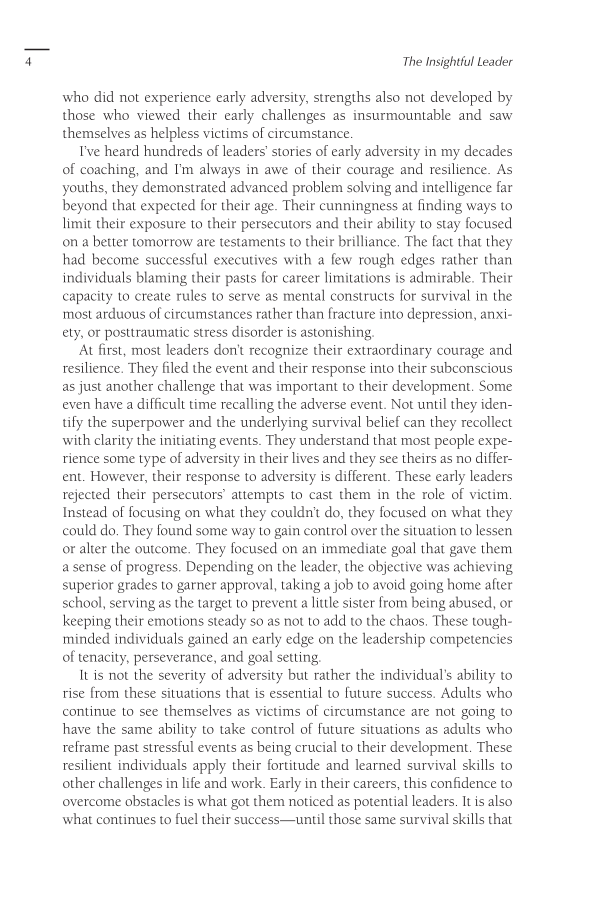4 The Insightful Leader who did not experience early adversity, strengths also not developed by those who viewed their early challenges as insurmountable and saw themselves as helpless victims of circumstance. I’ve heard hundreds of leaders’ stories of early adversity in my decades of coaching, and I’m always in awe of their courage and resilience. As youths, they demonstrated advanced problem solving and intelligence far beyond that expected for their age. Their cunningness at finding ways to limit their exposure to their persecutors and their ability to stay focused on a better tomorrow are testaments to their brilliance. The fact that they had become successful executives with a few rough edges rather than individuals blaming their pasts for career limitations is admirable. Their capacity to create rules to serve as mental constructs for survival in the most arduous of circumstances rather than fracture into depression, anxi- ety, or posttraumatic stress disorder is astonishing. At first, most leaders don’t recognize their extraordinary courage and resilience. They filed the event and their response into their subconscious as just another challenge that was important to their development. Some even have a difficult time recalling the adverse event. Not until they iden- tify the superpower and the underlying survival belief can they recollect with clarity the initiating events. They understand that most people expe- rience some type of adversity in their lives and they see theirs as no differ- ent. However, their response to adversity is different. These early leaders rejected their persecutors’ attempts to cast them in the role of victim. Instead of focusing on what they couldn’t do, they focused on what they could do. They found some way to gain control over the situation to lessen or alter the outcome. They focused on an immediate goal that gave them a sense of progress. Depending on the leader, the objective was achieving superior grades to garner approval, taking a job to avoid going home after school, serving as the target to prevent a little sister from being abused, or keeping their emotions steady so as not to add to the chaos. These tough- minded individuals gained an early edge on the leadership competencies of tenacity, perseverance, and goal setting. It is not the severity of adversity but rather the individual’s ability to rise from these situations that is essential to future success. Adults who continue to see themselves as victims of circumstance are not going to have the same ability to take control of future situations as adults who reframe past stressful events as being crucial to their development. These resilient individuals apply their fortitude and learned survival skills to other challenges in life and work. Early in their careers, this confidence to overcome obstacles is what got them noticed as potential leaders. It is also what continues to fuel their success—until those same survival skills that
Document Details My Account Print multiple pages
Print
You have printed 0 times in the last 24 hours.
Your print count will reset on at .
You may print 0 more time(s) before then.
You may print a maximum of 0 pages at a time.


















































































































































































